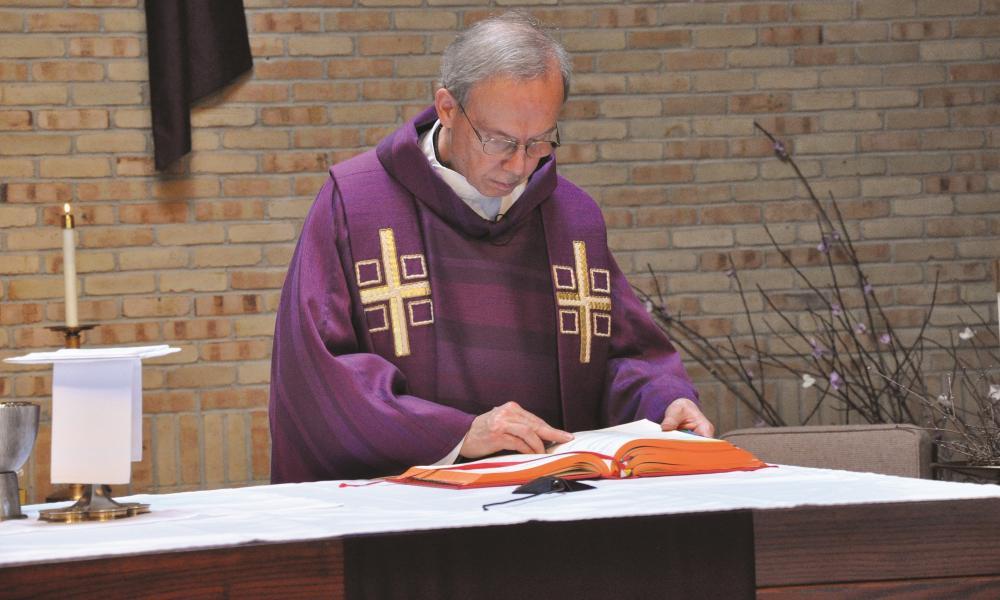
What Will We Be Praying at Mass? The Presidential Prayers - Propers
Four times during the Mass, the priest, who presides over the assembly in the person of Christ, addresses God in the name of all those present. We call these the presidential prayers because they are voiced by the presider. (GIRM 30) Foremost among these is the Eucharistic Prayer, but three other orations (ora, “to pray”) are offered that are proper to the Mass – that is, they are particular to the liturgical day or rite.
The collect
We encounter the first one at the conclusion of the introductory rites.First, the priest says “Let us pray” and in the silence that follows, we focus on the fact that we are in God’s presence and call to mind all the intentions we may bring before the Lord this day. Then the priest begins the opening prayer, or the collect,”so called because it “gathers together” the silent intentions of the faithful. (GIRM 54)
Like all Roman Rite prayers, it is marked with noble simplicity and clarity of expression. The collect concisely expresses the character of this particular celebration. It has three major parts – the address(“Heavenly Father,” “Almighty God”), the petition (“Grant that we may …) and the conclusion, which acknowledges the mediation of Christ. The conclusion changes depending on the rest of the prayer.
• If the prayer is addressed to God, it will conclude with “Through our Lord Jesus Christ, your Son, who lives and reigns with you in the unity of the Holy Spirit, God forever and ever.
• If the prayer is directed to the Father, but the Son is mentioned as the end: “who lives and reigns with you and the Holy Spirit, God, forever and ever.”
• On the rare occasions when it is directed to the Son, the prayer ends with “You live and reign with God the Father, in the unity of the Holy Spirit, God forever and ever.”
In the current translation, we hear the phrase “We ask this through …” But there are no words for “we ask this”in the Latin original, so in the new translation, the priest will merely say “Through Christ our Lord …”
We make the prayer our own by responding “Amen.” This is a great Aramaic word. It sounds the same in Latin. It means “so be it” or “it is so.” With this word, we assent to what is true. (cf. Deut 27:15; 1 Cor 14:16)
Prayer over the offerings
At the beginning of the Liturgy of the Eucharist, the gifts of bread and wine are brought forward. After they have been placed on the altar and the accompanying rites completed, the priest invites us to pray that these gifts may be acceptable to the Father. He then prays the prayer over the offerings. (GIRM 77)
There is evidence that the Church has prayed a prayer over the gifts since the 11th century. For many centuries, the prayer was recited quietly and was called “the secret.”But in the reforms of Vatican II, the name of the prayer and its manner of recitation were restored.
In the Mass, only one prayer over the offerings is said and it ends with the shorter conclusion: “Through Christ our Lord.” Again, if Jesus has been mentioned in the prayer, the conclusion changes. As before, the people unite themselves to the entreaty and make the prayer their own with the acclamation, “Amen.”
The prayer after Communion
After the distribution of Communion, the people pray together silently or sing a hymn of thanksgiving. (GIRM 164) “To bring to completion the prayer of the people of God, and also to conclude the entire Communion rite, the priest says the prayer after Communion, in which he prays forthe fruit of the mystery just celebrated. (GIRM 89) He uses the shorter conclusion “Through Christ our Lord.” Again, this will vary depending on the totality of the text. We affirm the prayer with our “Amen.”
These prayers have a rich history and are part of the rich heritage of the Church. All of them have undergone a new translation so we may hear a phrase that is new to us. Listen attentively to the rich theology they contain and to the petitions that they address to the Father. Then give the prayer a sincere and hearty “Amen.”



